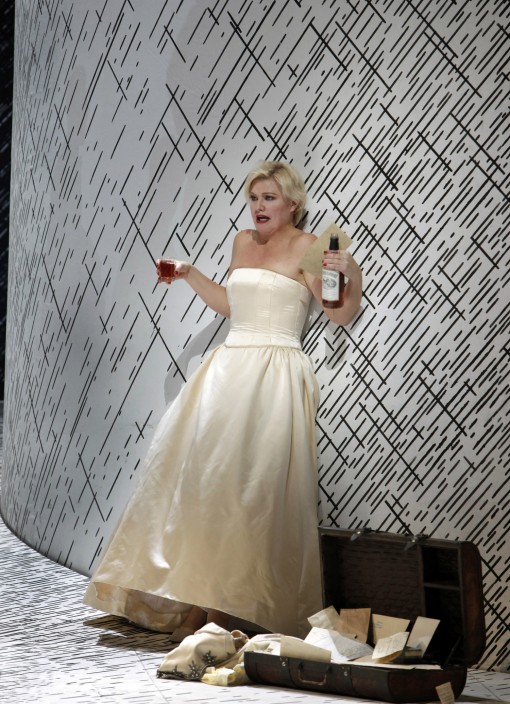Mattila’s memorable immortal diva highlights San Francisco Opera’s stylish “Makropulos”

Karita Mattila as Emilia Marty in "The Makropulos Case," which opened Wednesday night at San Francisco Opera. Photo: Cory Weaver.
One of those great impromptu opera moments took place Wednesday night in Act 2 of The Makropulos Case. After being pawed by an elderly admirer, Karita Mattila as Emilia Marty, reacted to the ensuing audience laughter by looking out at the house, in character, with imperious stony contempt before returning her gaze to the stage and the action.
A memorable touch in San Francisco Opera’s stylish and compelling new production of Leoš Janáček’s The Makropulos Case, which opened Wednesday night at War Memorial Opera House.
The company has enjoyed a long and important history with Janáček’s opera. San Francisco Opera presented the U.S premiere of Makropulos in 1966 with Marie Collier, reviving the opera in 1976 and 1993.
The strange and convoluted tale, adapted from Karel Capek’s play, concerns the celebrated opera singer Emilia Marty who appears to have intimate knowledge of the details of a century-old probate case that is drawing to an end. In reality, Marty is the 337-year-old daughter of Emperor Rudolf II, and was given a potion to make herself immortal. Through the centuries, she has had countless affairs with countless men in different countries and under different names, yet always with the initials E. M. (Elina Makropulos, Ellian MacGregor, Eugenia Montez). Buried in the legacy at the center of the legal case is the formula, which Marty requires, to continue her eternal life.
Emilia Marty is a kind of Moravian time-traveling Lulu–via Vienna, Greece, Scotland and Spain—bewitching all men who cross her path and leading them to their doom. Janáček clearly saw in the beautiful heartless Emilia a reflection of Kamila Stösslová, the married, much younger involuntary muse of many of his late works, with whom the composer was romantically obsessed.
For all its fantastical plot, The Makropulos Case lacks the immediacy of the rustic-village drama of Jenufa and Katya Kabanova, with the composer’s libretto getting bogged down in the baffling details of the legal case and Emilia’s history. Yet if the dramaturgy is oddly stilted, Janáček’s music is as fascinating as in his finest operas, a restless, roiling torrent of astringent angularity, pungent folk harmonies and sudden, fragmented moments of lyric beauty.
Karita Mattila, in a role debut, was born to play the part of the beautiful, mysterious immortal feminine Emilia Marty, and the only surprise is that the Finnish soprano has waited this long to tackle the character. As shown in her celebrated portrayals of Jenufa and Katya, Mattila is completely at home in Janáček’s tricky style of folk-flavored sprechstimme with its long lines and broken shards of lyricism.
With her short blond hair, shapely legs, and clad in chic Chanel and Givenchy-inspired 1950s outfits, Mattila brought an apt Hollywood glamour to the opera star Marty, as well as a fiery dramatic punch, the soprano singing with vehement intensity and never softening the harsh edges of this cruel, petulant yet internally tortured woman.
Olivier Tambosi’s direction was fluent and skillfully handled but some staging issues opening night need to be rethought, like Emilia’s violent and prolonged head-shaking of Gregor. And while there is certainly a wry, acid-tinged humor in this opera, Emilia’s drunkenness and repeated swilling of whiskey in the final scene are overdone, making her transition to a pitiable ennobled figure at the coda too sharp a turn. No doubt these details will get ironed out during the course of the run, and one can unreservedly add Emilia Marty to Mattila’s roster of acclaimed Janacek heroines.
As Albert Gregor, the case plaintiff with a family connection who is manipulated by the calculating Emilia, Miro Dvorsky proved equally ideal casting. Dvorsky’s febrile Slavic tenor brought an idiomatic ease to Janáček ‘s music and Dvorsky was dramatically credible as the middle-class everyman anguished by his attraction for the heartless Marty.
As Prus, Gerd Grochowski was terrific in his company debut, the tall German bass-baritone embodying the suave stiff aristocrat who also falls under Emilia’s spell.
Matthew O’Neill proved quite funny as the ancient but impressively randy Hauk-Sendorf. Dale Travis as the attorney Kolenaty, Thomas Glenn as Vitek, Susanna Biller as Kristina and Brian Jagde as Janek rounded out the exemplary cast.
Frank Philipp Schlossmann’s stylish rotating set updates the action to the mid 20th century, largely unobtrusively. Most striking is the design for Kolenaty’s law office with a towering wall of bookcases and a large working clock in real time nicely marking the temporal nature of life. (The set also helps keep attention centered during the long exposition in Act 1 about the legal case, which is not one of Janáček’s more riveting passages.) The designs for the ensuing acts are less elaborate but equally effective.
Jiří Bělohlávek made an inspirational company debut leading these performances. The Czech conductor has an innate sense of how this challenging music should go, keeping firm forward momentum and supporting the singers sensitively, while forcefully bringing out the surging elemental power of Janáček’s restless score.
These performances are dedicated to the memory of Sir Charles Mackerras, who passed away in July. A former principal guest conductor at San Francisco Opera, Mackerras, acclaimed for his Janáček scholarship and conducting, led the company’s last performances of The Makropulos Case in 1993.
The Makropulos Case runs through November 28. sfopera.org; 415-864-3330